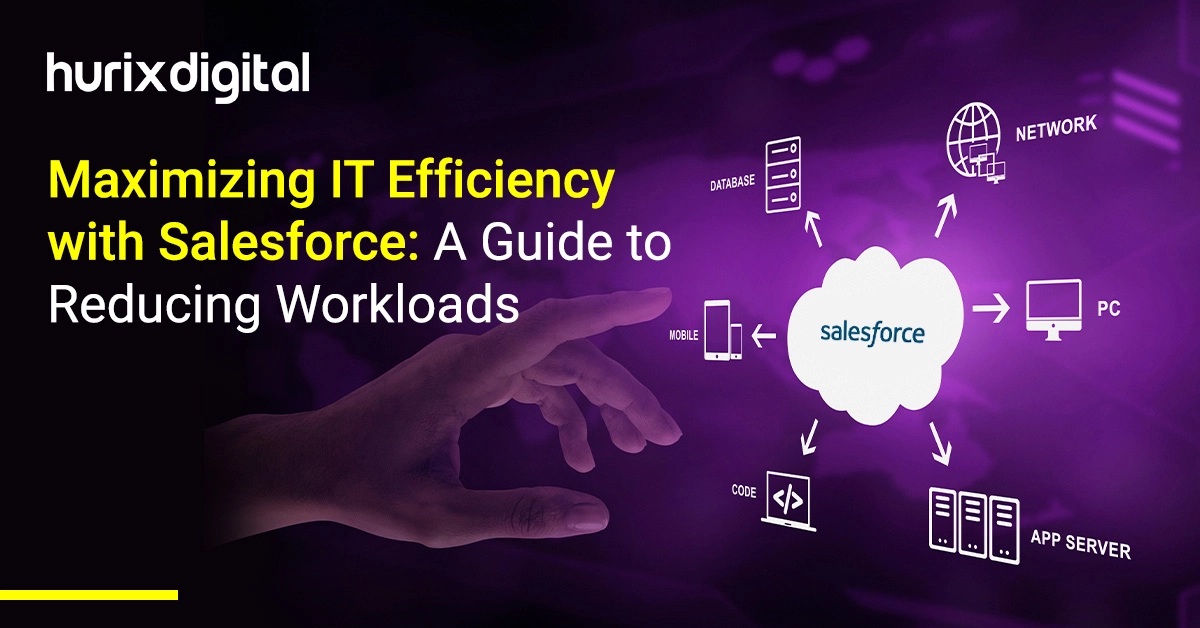
What CIOs and CTOs Should Know about the Future of Salesforce Integrations!
Summary
This article explores key Salesforce integration trends like AI, XR, hyper-personalization, blockchain, citizen development, voice tech, influencer marketing, and cloud integration for optimizing CRM.
In an era of fast-evolving digital transformation, Salesforce is a critical tool for businesses to optimize customer relationship management (CRM).
As technology evolves, the future of Salesforce integrations holds key trends that CIOs and CTOs must know to stay ahead of the curve. Understanding these trends helps streamline operations and ensure organizational growth in a rapidly changing digital landscape.
As organizations refine their strategies, the role of leadership becomes pivotal. Cross-functional alignment among C-suite executives is essential to breaking down silos and driving cohesive Salesforce integration initiatives.
The emergence of AI accelerates this evolution, modernizing customer service infrastructures and streamlining operations. This study explores emerging technologies for Salesforce, offering valuable information for CIOs and CTOs aiming to enhance their CRM investments.
Table of Contents:
Trends in Salesforce Integrations
Let us explore the top Salesforce Integrations that deliver significant value to businesses. Identifying and prioritizing these effective integrations is crucial for maximizing the return on Salesforce investment.
1. Redefining Customer Experience with AI
Salesforce’s inclusion of generative AI has marked a major turning point in the development of CRM technology. IT executives must exercise strategic leadership to transform the CRM landscape as AI develops and becomes sophisticatedly integrated within Salesforce.
This convergence empowers businesses to harness AI’s power to automate routine tasks, deliver hyper-personalized experiences, and uncover actionable insights from vast datasets. By automating mundane processes, AI frees human resources to focus on higher-value activities, driving productivity and efficiency.
Moreover, AI-driven predictive analytics enable organizations to anticipate customer needs and take preemptive action on possible issues. This proactive approach facilitates stronger customer relationships and improves overall satisfaction.
Predicting customer behavior and addressing needs proactively is a game-changer for organizations, enabling them to stay ahead of the curve. CIOs and CTOs must acknowledge the connection between AI and CRM to help their company provide high value in all customer interactions.
Also Read: The Ultimate Guide to Custom Software Development for Small Businesses!
2. The Emergence of Extended Reality
Integrating Augmented Reality (AR) into Salesforce marks a new era in field service activities. AR allows employees to boost efficiency, reduce downtime, and enhance customer satisfaction through interactive resources and real-time visual instruction.
Extended Reality (XR), encompassing both Augmented Reality (AR) and Virtual Reality (VR), holds immense potential to rethink CRM tactics. From training and product demonstrations to virtual inspections and remote assistance, XR offers tremendous potential for transforming customer interactions.
The extended reality (XR) market is poised for explosive growth, with projections indicating a valuation of USD 1,706.96 billion by 2032. Organizations now use XR for a competitive advantage in integrations, driven by an astounding CAGR of 32.1%.
Its Salesforce integration will also become easier to use. To capitalize on the benefits of this emergent technology, CIOs and CTOs need to monitor XR trends closely. By carefully integrating XR into Salesforce, organizations may reimagine customer engagement and drive operational excellence.
3. Hyper-Personalization
Hyper-personalization is the pinnacle of the customer experience, offering customized encounters that deeply connect with personal preferences. With artificial intelligence and advanced analytics, businesses may supply dynamic content, anticipate client requirements, and cultivate long-term loyalty.
Salesforce’s AI-driven capabilities demonstrate the company’s commitment to this paradigm shift by allowing businesses to develop tailored client journeys. This shift in client experiences from generic to hyper-personalized is supported by a deep understanding of their behavior and preferences.
4. Blockchain Technology
Strong security measures are essential since cyber threats are always changing. Blockchain technology offers an unbreakable barrier of immutability that protects sensitive consumer data from data breaches.
Salesforce’s incorporation of blockchain technology represents a major improvement in CRM security and transparency. Because blockchain technology is immutable and decentralized, Salesforce can provide improved data protection, secure transaction records, and verifiable customer IDs.
Salesforce can cultivate trust and strengthen its client connections by creating an auditable, transparent record of transactions. The revolutionary potential of blockchain technology and its role in safeguarding CRM going forward are imperative recognitions for CIOs and CTOs.
5. The Rise of Citizen Development
The rise of no-code and low-code development platforms in the Salesforce ecosystem represents a major change in app development. These platforms enable non-expert coders to design personalized solutions, making development more accessible and speeding up product launch times.
Citizen developers can quickly create customized applications for business requirements using user-friendly drag-and-drop interfaces and ready-made components. Promoting development democratization encourages innovation, agility, and improved business efficiency.
CIOs and CTOs must acknowledge citizen development’s capabilities in boosting business growth and improving operational efficiency. Organizations can utilize citizen developers’ potential by giving them tools and guidance while overseeing development.
6. Voice-Activated CRM
Salesforce integrations of voice technology represent a major improvement in the CRM user experience. CIOs and CTOs must understand how voice-activated CRM may improve customer satisfaction and staff productivity.
Salesforce is leading the way in a new era of hands-free productivity by providing voice-driven data entry, search, and analytics interactions. This move to voice-activated CRM aligns with general industry trends and demonstrates the rising need for simple, readily available user interfaces.
As voice technology advances, we may anticipate more advanced features like real-time transcription, natural language processing, and sophisticated speech recognition.
7. Influencer Marketing
Salesforce’s deliberate emphasis on influencer marketing highlights the platform’s dedication to providing all-inclusive solutions for customer engagement. CIOs and CTOs need to understand how influencer marketing may propel company expansion and think about how Salesforce can be used to optimize its effects.
Organizations may establish strong brand affinity and produce high-quality leads by coordinating influencer marketing efforts with more comprehensive CRM initiatives and enabling businesses to find, collaborate with, and assess influencers’ impact.
Influencer marketing’s incorporation into the CRM ecosystem presents a potent chance to target particular audience segments and enhance campaign performance.
8. Cloud-to-Cloud Integration
Salesforce Integrations with other cloud-based apps are becoming more common as cloud adoption quickens. The cloud-to-cloud connection is becoming increasingly important strategically for businesses to utilize their cloud investments fully.
With public cloud infrastructure, businesses can easily grow internationally while maintaining data residency and local law compliance. This method improves scalability, performance, and security, allowing companies to take advantage of new market opportunities and provide outstanding client experiences globally.
Also Read: The Ultimate Guide to Choosing the Right Content Management System for Your Business in 2024!
The Bottom Line
You can gain a competitive edge in Salesforce integrations with the effective use of these strategies. CRM connections with other enterprise systems are essential to use client data to its full potential. Dismantling organizational silos and promoting data-driven decision-making help companies gain a comprehensive understanding of their customers and deliver better experiences.
Want to revolutionize your business with advanced CMS solutions and Salesforce data integration? Hurix Digital provides a full range of services to enhance online visibility and streamline processes.
Our experts offer customized solutions to meet your needs, from developing effective content management strategies to smoothly incorporating your Salesforce data. Let us help you make informed choices, improve customer satisfaction, and promote business expansion.
Schedule a call with Hurix Digital today!

Currently serving as the Vice President of Technology Delivery Operations at HurixDigital, a prominent global provider of digital content and technology solutions for publishers, corporations, and educational institutions. With over 16 years of experience spanning EdTech and various domains, I hold certification as a SCRUM Product Owner (CSPO). My expertise includes operations, finance, and adept people management skills.




